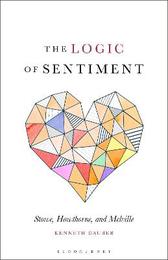
|
The Logic of Sentiment: Stowe, Hawthorne, and Melville
Paperback / softback
Main Details
Description
The Logic of Sentiment is a study of sentimentality, a literary mode that aims to answer the question, "What hold us together?" Against the grain of cultural studies, which understands sentimentality as consolidating communities on the basis of material or historical foundations, Kenneth Dauber takes a philosophical approach. He argues that sentimentality is love conceptualized in denial of a skepticism--understood as the problem of people's otherness to each other--that material associations cannot dispel. Through close readings in the style of "ordinary language" criticism, Dauber analyzes mid-19th-century American novels, where sentimentality achieved its most complete articulation, with a focus on three novels published nearly simultaneously-Uncle Tom's Cabin, The House of the Seven Gables, and Pierre. Referencing a wide range of philosophical and literary texts, Dauber examines the response of sentimental writers to their growing awareness of love's lack of foundation, the waywardness with which individuals dispose themselves as they succeed and fail in achieving a viable "we." The Logic of Sentiment traces the movement from sentimentality to realism, the relation between epistemology and ethics, and the kind of investments that writers attempt to solicit from their readers.
Author Biography
Kenneth Dauber is Professor of English at SUNY Buffalo, USA. He is the author of three books, including The Idea of Authorship in America (1990) and Rediscovering Hawthorne (1977), and is co-editor, with Walter Jost, of Ordinary Language Criticism (2003).
ReviewsThe word logic is not often used with the word sentiment. In connecting the two, Dauber (SUNY, Buffalo) engages with three literary texts: Harriet Beecher Stowe's Uncle Tom's Cabin (1852), Nathaniel Hawthorne's The House of Seven Gables (1851), and Herman Melville's Pierre (1852). In his philosophical analysis, Dauber makes deep inquiries into how 'out of the heart of sentimentality's repression of skepticism, the three novels begin the process of embracing it, moving toward the reconstruction of community on the ground of skepticism' (p. 9). The chapter on Stowe's landmark novel is the most bracing. In it, Dauber questions generic contours that readers have taken for granted, probing, for example, how Stowe 'reveals the way in which realism is a kind of sentimentality as well, translating the subjectivity of insidedness into outsidedness so effectively that it is simply never noticed as such' (p. 35). Further, discussion of Stowe reveals that 'knowing' is objective and realism is thus 'sentimentality unsentimentally articulated' (p. 46). The discussion of the character Augustine St. Clare as a skeptic is particularly useful; Dauber reads St. Clare 'not as one who does not know, but [as one] whose knowing no longer speaks to him. He knows, but has no feeling for what he knows' (p. 48). Summing Up: Recommended. Graduate students, researchers, faculty. * CHOICE * In The Logic of Sentiment, Kenneth Dauber both redefines the American sentimental tradition as the fear of skepticism--the insistence that to be loved the other must be known--and expands the reach of philosophically grounded literary criticism beyond its usual questions, authors, and objects. With this, he proposes new ways of thinking about affect and sociality, arguing that only a wayward love beyond what we know of each other can found community. * Jennifer Greiman, Associate Professor of English, Wake Forest University, USA, and author of Democracy's Spectacle: Sovereignty and Public Life in Antebellum American Writing (2010) and co-editor of The Last Western: Deadwood and the End of American Empire (2013) * In this lovingly dubious thought experiment, Kenneth Dauber discerns the skeptic as the figure to whom Stowe, Hawthorne, and Melville must deny entry to the sentimental communities they have conjured in three iconic 19th-century novels. Reading these prototypical sentimental novels from the point of view of the skeptic, Dauber identifies skepticism's aversion as what sustains the communal logics of sentiment; Dauber also hails skepticism's embrace as the unacknowledged heart of the genre. * Donald E. Pease, Founding Director of the Futures of American Studies Institute, Dartmouth College, USA * This excellent project offers readers of literature and students of philosophic thinking a genuinely different approach to cultural difference. In his philosophic reading of the rise of the sentimental novel, Dauber juxtaposes 'knowing' and 'feeling' and 'loving' in myriad tensions and surprising kinships, each one of them careful, thoughtful, informed, and non-dogmatic--a desirable kind of study at any time, but all the more rare, and valuable, in our own. * Walter Jost, Professor of English, University of Virginia, USA, and author of Rhetorical Thought in John Henry Newman and Rhetorical Investigations: Studies in Ordinary Language Criticism (2004) *
|